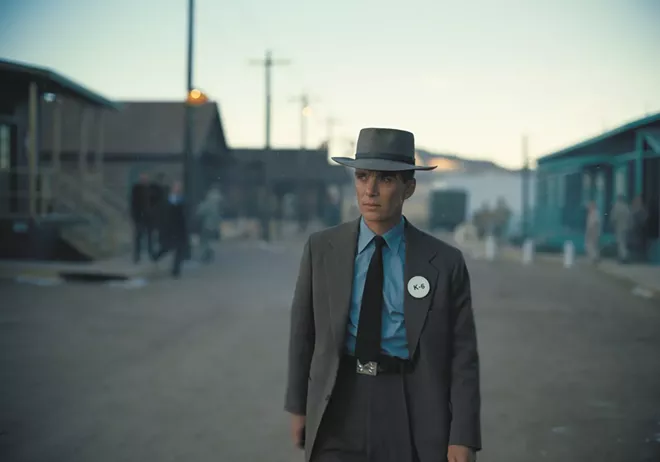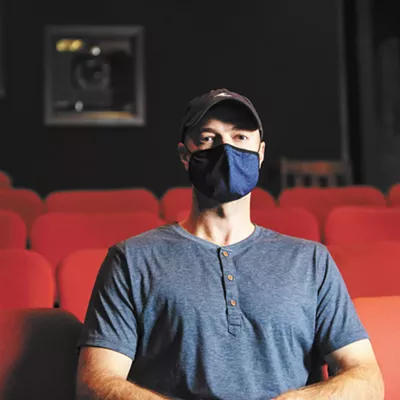In Christopher Nolan's upcoming biopic Oppenheimer, Irish actor Cillian Murphy has top-billing as the titular nuclear physicist whose atomic bomb innovations with the Manhattan Project have reverberated throughout mankind's psyche, warfare and politics for seven decades and counting. It's a rare star turn for Murphy, an excellent actor who has stuck mostly to supporting roles throughout his quarter-century-long career. Will Oppenheimer be his moment of triumph or will the film (and Murphy's possible awards consideration) detonate on impact?
Murphy first broke through as a leading man in 2002's apocalyptic thriller 28 Days Later. His performance displayed many of the qualities that would come to define his onscreen persona in the years to follow — a haunted sense that radiates from behind his sky blue eyes and an unusual vulnerability that nonetheless doesn't preclude convincing outbursts of violence. Murphy bares it all, literally, in his introduction on screen, as exposed to an audience as an actor could possibly be. There's a transcendent moment of more emotional nakedness in the third act, when Jim, bound, bleeding and emaciated, catches a fleeting glimpse of an overhead jet plane, providing a brief glimmer of hope. In this wordless moment, Murphy's distinctive eyes do all the work. It's the crystalline instant where you could tell the man can hold the screen, whether on your smartphone or in an IMAX auditorium.
Sometimes Murphy embodies an unnerving creep, and sometimes he gives off the vibe of a dude in serious need of a hug, but both spring from the same well. Despite his strong efforts, that seminal turn-of-the century horror film didn't herald Murphy's anointment as a capital-M Movie Star, and it's not hard to see why. He's overwhelmed by the movie's noise (both figurative and in the form of its confrontationally low-tech visuals), its reinvigoration of the zombie genre (they run now!), and the War on Terror geopolitical real-world horrors that swirled around its release. Speaking of context, the scene where Murphy's humble bicycle courier Jim wakes up from a coma to a near-empty London ravaged by a deadly contagion might be a little... difficult... to revisit in 2023. Jim is confronted by a world infected by rage. Sound familiar?
After that breakthrough film, the template was set and his modest-but-prolific career was off to the races. In subsequent years he would play second, third or fourth fiddle in films from auteurs like Wes Craven and Anthony Minghella.
He regained his blockbuster footing as a villain in 2005's Batman Begins, the first of many collaborations with Christopher Nolan that have now culminated in this critical career junction. His Jonathan Crane (aka the Scarecrow) was a true sicko, all spindly frame and vocal tics. But his portrayal would inevitably be overshadowed by the two endlessly quotable and bombastic villain performances of Nolan's subsequent Dark Knight film series (Heath Ledger's Oscar-winning tour de force as the Joker and Tom Hardy's eloquent and distinctively accented terrorist Bane). Nolan clearly saw something in Murphy, initially casting him after the actor failed his audition for the lead role of the Caped Crusader. (You can find clips of his screen test online — he would have made a perfectly tormented Bruce Wayne, but an unconvincing Batman.) The director keenly deployed Murphy's singular, wounded magnetism in later work together, but the thespian remained relegated to the supporting column: Always the bridesmaid, never the bomb-dropping bride.
One gets the sense that when Murphy really came into his own as a pseudo-household name — the kind that even casual media consumers revere and boomer moms swoon over — was when he starred as Thomas Shelby in the BBC/Netflix period gangster drama Peaky Blinders. The show indulged in Murphy's capacity for evincing malevolence and "there's something off about this guy" energy. Blinders ran for six critically acclaimed seasons and — fun fact for your next pub trivia night — the show marked the fourth occasion to date that Murphy has shared the screen with the aforementioned Tom Hardy. (If you can name the other three off the top of your head, the next round's on me.)
Now, Murphy's finally being offered his overdue stab at the A-list. He's almost too perfectly cast in the role of one of history's most controversial figures, with his shocking resemblance to the scientist himself — he has the thousand-yard stare and gaunt features, and an innate knack for subtly expressing a well of conflict bubbling beneath the surface like so many colliding atoms.
The biggest obstacle standing in his way is a certain platinum blonde Jill of All Trades whose also-eponymous film opens on the same day. It's the kind of major studio counterprogramming that gets film dork's tongues wagging and stands as one of the biggest cinematic clashes of titans in recent memory. Maybe there won't be any Mutually Assured Destruction, as the memes about Oppenheimer/Barbie double-features have been flooding social media for almost a year now. Maybe we can collectively celebrate the possible renewal of theatrical box office success, even if it means a little atomic exposure to naked capitalism and world-ending crucibles. Either way, I'll be rooting for both Barbie and Murphy, whether he'll prove to be death, the destroyer of ticket sales or not. ♦
Oppenheimer opens in theaters on July 21.






















